Outcomes of High-Quality Montessori Education
- Improved School Readiness: According to a 2012 study by Angeline Lillard, children in high fidelity Montessori primary (PK3-K) programs show greater gains in executive function, reading, vocabulary, mathematics and social problem-solving than children in high-quality traditional daycare programs or in partially-implemented Montessori programs.1
- Strengthened Executive Function: A 2011 review of research by Adele Diamond and Kathleen Lee shows that Montessori programs aid in the development of executive function, a critical component in school success.2
- Reduced Achievement Gap: In the Montessori schools affiliated with Montessori Partners Serving All Children in St. Paul, Minnesota, which serve 60% students in poverty, nearly all students are performing at or above the normal range, with no achievement gap by ethnicity, home language, or socio-economic status.3
- Higher Math and Science Performance: A 2007 study of Milwaukee Public School graduates found that students who had attended Montessori programs from preschool through fifth grade scored significantly higher on high school standardized tests in math and science than a matched group of peers.4
- Improved English Fluency: At Lumin Education (formerly East Dallas Community Schools), a Montessori program in Dallas, Texas, 42% of the children served are Limited English Proficient upon entering the school, but 100% test fluent in English by the end of third grade.5
- Increased High School Graduation Rate: Students who attended Lumin’s program through third grade graduate from high school at a rate of 94%, compared to the local rate of less than 50%.6
- Increased Engagement and Joy in Learning: A 2003 study by Kevin Rathunde using the Experience Sampling Method found that middle school students in Montessori schools were significantly more engaged and interested when doing academic work than were students in traditional middle schools.7 Younger students, too, experience this joy in learning!
See the website of the National Center for Montessori in the Public Sector for links to this research and more.
1 Lillard, A.S., “Preschool Children’s Development in Classic Montessori, Supplemented Montessori, and Conventional Programs,” Journal of School Psychology 50:379-401 (June 2012)
2 Diamond, A. & Lee, K., “Interventions Shown to Aid Executive Function Development in Children 4 to 12 Years Old,“ Science 333:959-964 (August 2011)
3 Montessori Center of Minnesota 2012-13 Annual Report, p. 12, available from the Montessori Center of Minnesota.
4 Dohrmann, Kathryn Rindskopf, Tracy K. Nishida, Alan Gartner, Dorothy Kerzner Lipsky & Kevin J. Grimm (2007) High School Outcomes for Students in a Public Montessori Program, Journal of Research in Childhood Education, 22:2, 205-217
5 East Dallas Community Schools Summer Newsletter 2010, available from National Center for Montessori in the Public Sector.
6 Ibid.
7 Rathunde, K., “A Comparison of Montessori and Traditional Middle Schools: Motivation, Quality of Experience, and Social Context,” The NAMTA Journal 28.3 (Summer 2003): pp. 12-52.


